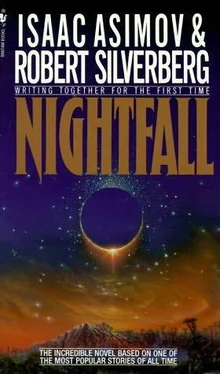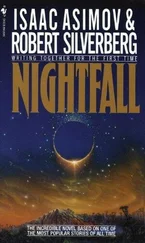Isaac Asimov - Nightfall And Other Stories
Здесь есть возможность читать онлайн «Isaac Asimov - Nightfall And Other Stories» весь текст электронной книги совершенно бесплатно (целиком полную версию без сокращений). В некоторых случаях можно слушать аудио, скачать через торрент в формате fb2 и присутствует краткое содержание. Год выпуска: 1972, ISBN: 1972, Издательство: Fawcett Publications, Inc., Жанр: Фантастика и фэнтези, на английском языке. Описание произведения, (предисловие) а так же отзывы посетителей доступны на портале библиотеки ЛибКат.
- Название:Nightfall And Other Stories
- Автор:
- Издательство:Fawcett Publications, Inc.
- Жанр:
- Год:1972
- ISBN:ISBN: 0-449-01969-1
- Рейтинг книги:5 / 5. Голосов: 1
-
Избранное:Добавить в избранное
- Отзывы:
-
Ваша оценка:
- 100
- 1
- 2
- 3
- 4
- 5
Nightfall And Other Stories: краткое содержание, описание и аннотация
Предлагаем к чтению аннотацию, описание, краткое содержание или предисловие (зависит от того, что написал сам автор книги «Nightfall And Other Stories»). Если вы не нашли необходимую информацию о книге — напишите в комментариях, мы постараемся отыскать её.
Nightfall And Other Stories — читать онлайн бесплатно полную книгу (весь текст) целиком
Ниже представлен текст книги, разбитый по страницам. Система сохранения места последней прочитанной страницы, позволяет с удобством читать онлайн бесплатно книгу «Nightfall And Other Stories», без необходимости каждый раз заново искать на чём Вы остановились. Поставьте закладку, и сможете в любой момент перейти на страницу, на которой закончили чтение.
Интервал:
Закладка:
Ames was momentarily lost in his thoughts, "Something else. Organs to hear with; something for the sound waves. Ears! Where do they go? I don't remember where to put them!"
Brock cried out, "Leave it alone! Ears and all else! Don't remember!"
Ames said, uncertainly, "What is wrong with remembering?"
"Because the outside wasn't rough and cold like that but smooth and warm. Because the eyes were tender and alive and the lips of the mouth trembled and were soft on mine." Brock's lines of force beat and wavered, beat and wavered.
Ames said, "I'm sorry! I'm sorry!"
"You're reminding me that once I was a woman and knew love; that eyes do more than see and I have none to do it for me."
With violence, she added matter to the rough-hewn head and said, "Then let them do it" and turned and fled.
And Ames saw and remembered, too, that once he had been a man. The force of his vortex split the head in two and he fled back across the galaxies on the energy-track of Brock-back to the endless doom of life.
And the eyes of the shattered head of Matter still glistened with the moisture that Brock had placed there to represent tears. The head of Matter did that which the energy-beings could do no longer and it wept for all humanity, and for the fragile beauty of the bodies they had once given up, a trillion years ago.
In the spring of 1967, I received an interesting request. It seems there is a periodical called Abbot tempo, supported by Abbott Laboratories, a respected pharmaceutical firm. It is a slick-paper, impressively designed job, with excellent articles on various medical and near-medical subjects. It is printed in the Netherlands and is distributed free of charge to physicians in Great Britain and on the Continent. It is not distributed in the United States.
The editor of Abbottempo wrote to ask me to write a 2000-word science fiction story on a subject of medical interest that physicians would find at once interesting, amusing, and thought-provoking.
I was just as swamped with work at that moment as I am at all other moments, so I sighed and put a piece of letter paper in the typewriter, intending to write out a polite refusal.
Unfortunately, or fortunately, it takes time to pick up letter paper and a yellow second sheet, put a piece of carbon paper between, and roll the sandwich into the typewriter. It takes additional time to center the paper properly, type the date, address, and salutation.
What with all that time, I happened to think up a story I couldn't resist, so when I actually got past the "Dear Sir," I found myself typing a polite acceptance.
I wrote "Segregationist" in April 1967, on a theme that was completely and entirely science-fictional. It appeared in December 1967, just in time to be slightly behind the headlines in some respects.
The nicest result of the publication of the story, by the way, was that Abbottempo published it in each of their eight editions. They sent me a boxed collection of the set in 1) English, 2) French, 3) Spanish, 4) German, 5) Italian, 6) Japanese, 7) Greek, and 8) Turkish. I had never before had anything I had written translated into either Greek or Turkish, and the set remains one of the more interesting oddities of my personal library of Asimoviana.
First appearance-Abbottempo, Book 4, 1967. Copyright, 1968, by Isaac Asimov.
Segregationist
The surgeon looked up without expression. "Is he ready?"
"Ready is a relative term," said the med-eng. "We're ready. He's restless."
"They always are… Well, it's a serious operation."
"Serious or not, he should be thankful. He's been chosen for it over an enormous number of possibles and frankly, I don't think…"
"Don't say it," said the surgeon. "The decision is not ours to make."
"We accept it. But do we have to agree?"
"Yes," said the surgeon, crisply. "We agree. Completely and wholeheartedly. The operation is entirely too intricate to approach with mental reservations. This man has proven his worth in a number of ways and his profile is suitable for the Board of Mortality."
"All right," said the med-eng, unmollified.
The surgeon said, "I'll see him right in here, I think. It is small enough and personal enough to be comforting."
"It won't help. He's nervous, and he's made up his mind."
"Has he indeed?"
"Yes. He wants metal; they always do."
The surgeon's face did not change expression. He stared at his hands. "Sometimes one can talk them out of it."
"Why bother?" said the med-eng, indifferently. "If he wants metal, let it be metal."
"You don't care?"
"Why should I?" The med-eng said it almost brutally. "Either way it's a medical engineering problem and I'm a medical engineer. Either way, I can handle it. Why should I go beyond that?"
The surgeon said stolidly, "To me, it is a matter of the fitness of things."
"Fitness! You can't use that as an argument. What does the patient care about the fitness of things?"
"I care."
"You care in a minority. The trend is against you. You have no chance."
"I have to try." The surgeon waved the med-eng into silence with a quick wave of his hand-no impatience to it, merely quickness. He had already informed the nurse and he had already been signaled concerning her approach. He pressed a small button and the double-door pulled swiftly apart. The patient moved inward in his motorchair, the nurse stepping briskly along beside him.
"You may go, nurse," said the surgeon, "but wait outside. I will be calling you." He nodded to the med-eng, who left with the nurse, and the door closed behind them.
The man in the chair looked over his shoulder and watched them go. His neck was scrawny and there were fine wrinkles about his eyes. He was freshly shaven and the fingers of his hands, as they gripped the arms of the chair tightly, showed manicured nails. He was a high-priority patient and he was being taken care of… But there was a look of settled peevishness on his face.
He said, "Will we be starting today?"
The surgeon nodded. "This afternoon, Senator."
"I understand it will take weeks."
"Not for the operation itself, Senator. But there are a number of subsidiary points to be taken care of. There are some circulatory renovations that must be carried through, and hormonal adjustments. These are tricky things."
"Are they dangerous?" Then, as though feeling the need for establishing a friendly relationship, but patently against his will, he added, "… doctor?"
The surgeon paid no attention to the nuances of expression. He said, flatly, "Everything is dangerous. We take our time in order that it be less dangerous. It is the time required, the skill of many individuals united, the equipment, that makes such operations available to so few…"
"I know that," said the patient, restlessly. "I refuse to feel guilty about that. Or are you implying improper pressure?"
"Not at all, Senator. The decisions of the Board have never been questioned. I mention the difficulty and intricacy of the operation merely to explain my desire to have it conducted in the best fashion possible."
"Well, do so, then. That is my desire, also."
"Then I must ask you to make a decision. It is possible to supply you with either of two types of cyber-hearts, metal or…"
"Plastic!" said the patient, irritably. "Isn't that the alternative you were going to offer, doctor? Cheap plastic. I don't want that. I've made my choice. I want the metal."
"But…"
"See here. I've been told the choice rests with me. Isn't that so?"
The surgeon nodded. "Where two alternate procedures are of equal value from a medical standpoint, the choice rests with the patient. In actual practice, the choice rests with the patient even when the alternate procedures are not of equal value, as in this case."
Читать дальшеИнтервал:
Закладка:
Похожие книги на «Nightfall And Other Stories»
Представляем Вашему вниманию похожие книги на «Nightfall And Other Stories» списком для выбора. Мы отобрали схожую по названию и смыслу литературу в надежде предоставить читателям больше вариантов отыскать новые, интересные, ещё непрочитанные произведения.
Обсуждение, отзывы о книге «Nightfall And Other Stories» и просто собственные мнения читателей. Оставьте ваши комментарии, напишите, что Вы думаете о произведении, его смысле или главных героях. Укажите что конкретно понравилось, а что нет, и почему Вы так считаете.










